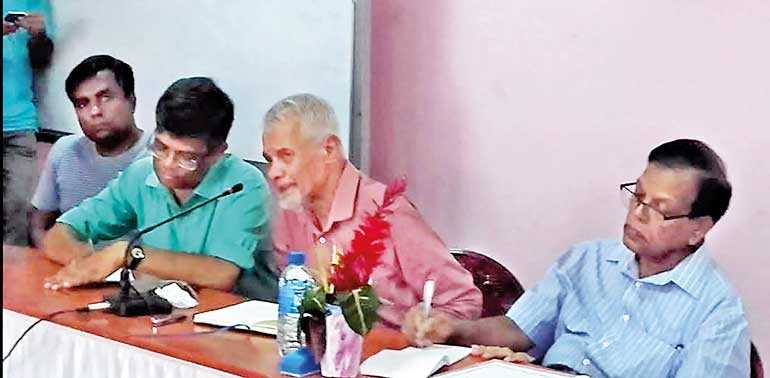Tuesday Feb 17, 2026
Tuesday Feb 17, 2026
Tuesday, 5 February 2019 01:37 - - {{hitsCtrl.values.hits}}

By S. Ratnajeevan H. Hoole
Yesterday, 3 February saw Victor Ivan speaking at the Jaffna Managers’ Forum (JMF), the only organisation in Jaffna bringing speakers with views of various hues and delivering lectures on diverse topics. In Jaffna, to say nothing is off-limits is touchy, but JMF’s Coordinator Vivekananthan Niranjan has managed to hold on to this liberal rule with steadfastness.
Tonight it was former Editor of Ravaya and present social worker’s Victor Ivan’s turn. His topic was “Sri Lanka’s Crisis: What Next?” He spoke in Sinhalese with University of Jaffna’s Sinhalese Language Lecturer at the Language Department translating competently to Tamil as well as occasionally to English.
The meeting was ably presided over by K. Sivalingam of the UK and of the SenthamilarIyakkam (translated as Red Tamils’ Movement but also could be rendered Pure Tamils’ Movement). Sivalingam was second-in-command of the Communist Party’s V. Ponnambalam, who challenged SJV Chelvanayakam for the KKS seat in 1975 on behalf of Srimavo’s ULF Government, then left the Communist Party and became sympathetic to the TULF as state atrocities against Tamils increased, and proposed Amirthalingam’s candidature in the 1977 elections.
Ivan’s theme was that Sri Lanka, to its detriment, has no Constitution after years of promises to reform. We need an independent Commission to undertake the drafting of a robust Constitution satisfying all stakeholders, he said. His position is that Parliament taking a top-down approach of “We know what is good for you” is an attitude from the 19th and 20th centuries inappropriate for the modern age, and that the promised Constitution will not come into being. He says the modern democratic method (which he advocates) is for citizens to form their advocacy organisations to offer draft proposals and run signature campaigns to pressure Parliament. This is what will yield a Constitution reflecting the various competing views in the country. Asked to name the countries that have traversed this route to Constitution-making, he mentioned Brazil, South Africa, Kenya and Norway, adding that there are as many as 19 such countries. He identified corruption as one of the main obstacles in Sri Lanka.
Ivan was accompanied to Jaffna by Dr. Sugath Amarajeewa, his media person. Ivan began by talking about the Donoughmore Constitution with the Commission coming in 1928, during the same month Mahatma Gandhi also came to Jaffna at the invitation of The Jaffna Youth Congress. Ivan’s talk was from 4:30 to 5:30 pm, and was followed by a robust discussion going on to well after 6:45 pm and continuing over dinner between him and select others.
Rajan Hoole congratulated Ivan for having begun with the Donoughmore Constitution and added many more details on it such as Molamure and Senanayake pushing for a literacy test for the right to vote with the intention of denying the vote to the Plantation Tamils, while its true effect would have been to deny the franchise to the majority of Sinhalese and Ceylon Tamils as well. He said the Soulbury Constitution failed in not having a fundamental rights chapter, which would have precluded the passing of the Citizenship Act. He called for expanded social intercourse with India, which would have a salutary effect on politics here.
The former Vicar General of the Jaffna Diocese, the Ven. S.J. Emmanuel, said that Tamils are very poor salesmen who will not stand up when customers come into their shop, and spoke of the importance of Tamils writing in English for Sinhalese to read how they feel.